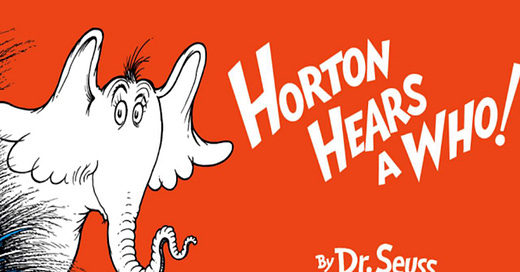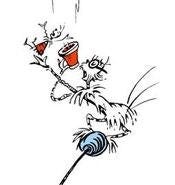If you’ve read any of my previous work, it will not come as a surprise to you that I prefer to write in metaphor. There are plenty of reasons to do so, but I’ll admit: the one that drives me hardest… is fear.
That’s right. I’m often too afraid to say — straight out — what I really think. Ironically, I’ve even written poems about it. (See here or here or here.) Growing up in a household where social opprobrium was to be avoided at all costs, I learned early and well to keep my unpopular thoughts to myself, and to turn to metaphor for plausible cover.
I could do it again. I could dance around my fear by writing a veiled poem that avoids naming what I see; in fact, I already have (A Bed for a Goat and Upstream) and may do so again.
But then I read essays by
, , , , , and , or listen to , , and .I witness friends losing their jobs.
And I think about how many times I read Horton Hears a Who to my children, and I know: the world right now demands more from me. Why that book? I’ll explain.
First, a brief refresher of Horton Hears A Who, for those who haven’t read it lately:
Horton, the compassionate elephant, is certain he hears a tiny voice crying for help from a speck of dust. He gently places it on a single clover flower to keep it safe, and then spends much of the book trying to protect it from an evil kangaroo and the rest of the jungle animals, including three monkey henchmen named the Wickersham Brothers.
Why? Because it turns out the speck is home to an entire microscopic town, as its Mayor explains to Horton in an equally microscopic voice that only Horton can hear. No one believes him:
“What rot!
This elephant’s talking to Whos who are not.
There aren’t any Whos and they don’t have a Mayor!
And we’re going to stop all this nonsense! So there!”
Deeply irked, the evil kangaroo takes her nastiness to a whole new level by enlisting those Wickersham thugs to rope the struggling Horton and tie him down, and then threatens to boil the clover “in a hot steaming kettle of beezle-nut oil.”
Panicked, Horton tells the Mayor to have everyone in Who-ville make as much noise as they possibly can, so that they will be heard by the kangaroo and the rest of the jungle. The Whos cry at the top of their lungs, “We are here! We are here! We are here! We are here!” They bang pots and pans, toot horns, you name it. Still, only Horton can hear them.
As a last ditch, Horton exhorts the Mayor to make sure that every single Who is making some kind of noise — no matter how small: “Are you sure every Who down in Who-ville is working? Quick! Look through your town! Is there anyone shirking?”
The frightened Mayor races through every building, floor to floor, until he discovers at last “a very small, very small shirker named Jo-Jo… standing, just standing, and bouncing a Yo-Yo.” He grabs him, telling him this is his town’s darkest hour, and climbs the Eiffelberg Tower. “We’ve GOT to make noises in greater amounts! So, open your mouth, lad! Every voice counts!”
When they get to the top, the lad clears his throat and shouts out, “YOPP!”
I’ll let Seuss tell it:
“That one extra Yopp put it over. Finally, at last!
From that speck on that clover
Their voices were heard!”
Once the kangaroo and her minions hear the voices of the Whos, they realize their mistake and Who-ville is saved… “by the Smallest of All.”
I know Dr. Seuss has been pilloried of late, and yet the messages in many of his books are profound and prescient. This one is a real punch in the gut for me.
I realize that I’ve been relatively quiet about what is happening in my town, New York State, and my country. I see tyranny unfolding all around me: illogical, over-reaching mandates; censorship; and civil liberties being slowly and surely stripped away. But for fear of upsetting loved ones or offending acquaintances or jeopardizing my career, I’ve chosen to shut up.
I’ve been a shirker. My version of the proverbial yo-yo is staying current and educating myself by reading books: on the history and use of propaganda; on the slow dismantling of laws meant to protect the average citizen; on the transformation of the media into a twisted wing of the entertainment business. I’ve also bounced my yo-yo by writing furiously in my journal or conversing with other like-minded folk.
None of that is useless, of course, but for someone who calls herself a writer? It’s not enough. Every day that goes by that I don’t “speak my truth” (a cliche I generally avoid but somehow can’t in this instance), I die a little inside.
When I first started blogging five years ago, my mission was to provide space for colliding thoughts on this giant paradox we call humanity. “We are, at all times in our lives, both finite and infinite, living and dying, material and intangible,” I said.
From that moment on, I’ve always written from an embrace of that paradox, but if I’m brutally honest with myself, I recognize that I’ve done it from the safe confines of a self-constructed cage of fear.
Not today. Today, I’m taking a deep breath and adding my small Yopp to the unwelcome, but vocal, minority. I’ve decided to switch from Medium to Substack, and I’m committed to writing essays, poems, and plays regularly that express the whole me: unpopular opinions, unvarnished experience, messy bits and all… because the more Yopps, the better.
(In fact, I have more to say about Horton Hears a Who and how it relates to the times in which we live, but I’ll leave that for another post.)
Before I go, here’s one more Seuss gem:
“Don’t give up! I believe in you all!
And a person’s a person, no matter how small!
All you small persons will not have to die
If you make yourselves heard, so, come on now, and TRY!”
Join me on Substack, by subscribing to The Art of Freedom. Free or paid access, your choice.






